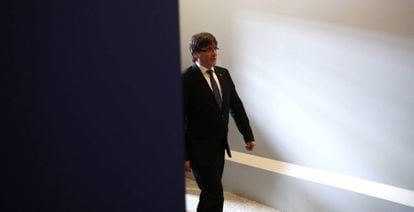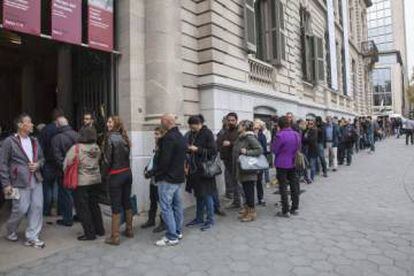Catalan secession law will allow for press control during referendum
Speaking in Madrid, regional premier Carles Puigdemont calls on central government to “negotiate”

The independence referendum that the Catalan government wants to hold in late September lacks even the minimum legal guarantees that its sponsors have been promising to uphold. The draft Juridical Transience Law, which EL PAIS has seen, contains significant gaps in the way Catalans would vote on whether to secede from Spain.

For one thing, the pro-sovereignty bloc in the regional parliament would receive the bulk of public subsidies available for the campaign, to the detriment of the remain campaigners.
For another, the bill leaves the door open to government interference in the media – both public and private news organizations – if they prove to be too critical.
Finally, it is unclear how the voter census would be drawn up.
Fast-track approval
The draft legislation aims to provide legal coverage to a referendum that Spain’s Constitutional Court has already ruled to be illegal.
It also aims to secure fast-track approval through a narrow 51% majority for several items of Catalan election legislation that have never prospered to date in the Catalan assembly because existing legislation requires approval by two thirds of the chamber.
During the campaign for the November 2014 vote, the Catalan government clashed with some private media organizations
The pro-independence majority also wants to create a Sindicatura Electoral de Catalunya, an oversight body that would have control over key aspects of the voting process.
If a referendum is finally held, this agency would be solely responsible for distributing the election propaganda slots, and in the case of public media, 70% of slots would be distributed among political groups in the regional assembly, proportional to the latest election results. This means that most of the airtime would go to the pro-independence bloc formed by the ruling Junts pel Sí coalition and the small Popular Unity Candidacy (CUP) party. A similar imbalance would take place in the distribution of public subsidies for the campaigning itself.
Media guidelines

The Sindicatura would also play a key role in controlling the media during the referendum campaign. It would “dictate the instructions it deems necessary” and, if it were to detect that certain news organizations are not covering the issue according to criteria that the Sindicatura considers opportune, “it can adopt compensation measures to restore the balance between the options being put to a referendum.”
This would enable authorities to “correct” a media organization’s editorial line if it is viewed as too supportive of one or the other option.
There is a precedent for this. During the campaign for the non-binding vote on self-rule held on November 9, 2014, the Catalan government clashed with some private media organizations after it tried to force them to publish campaign propaganda, free of charge.
Puigdemont in Madrid
Over 260 people on Monday attended a talk by Catalan Premier Carles Puigdemont on the subject of the independence referendum. The event, held inside Madrid City Hall, made headlines last Friday after the Deputy Prime Minister of Spain publicly asked Puigdemont to cancel the date and come instead to Spanish Congress – the "right place" to discuss sovereignty issues.
There were no representatives of either the ruling Popular Party (PP), the main opposition Socialist Party (PSOE) or the reform party Ciudadanos among the attendees. The only member of one of Spain’s four main political groups to show his face was Pablo Iglesias, head of the anti-austerity party Podemos.
Puigdemont evoked history in his address, calling for the same “sense of State” that allowed Catalan leader-in-exile Josep Tarradellas to return to Spain in 1977, after Franco’s death, and restore a Catalan government before there was even a Constitution or a Catalan charter of rights.
Ultimately, he warned that the referendum he is planning will be held, either through "a negotiated referendum" or one that is "backed internationally" if no support is found in Spain.
English version by Susana Urra.












































